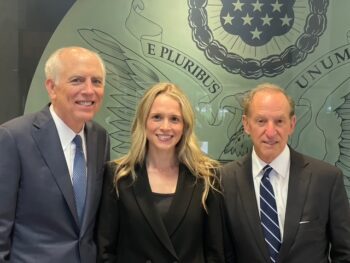As hurricane season kicks off, ensuring your company’s insurance coverage can withstand the storm is more important than ever. Commercial property insurance policies contain numerous potential coverage pitfalls that can significantly impact a corporate policyholder’s ability to recover for losses. These challenges often remain hidden until a loss occurs, at which point they can severely restrict or even eliminate coverage for otherwise valid claims. Understanding these common issues during the policy review process can help risk managers and legal counsel identify and address potential coverage gaps before they impact an organization.
Legislature’s Expansion of the Business Court Proves Lone Star State’s Commitment to Commercial Justice
Nine months ago, skeptics questioned whether Texas’ ambitious new business court would survive infancy. The specialized tribunal, which began operations Sept. 1, 2024, faced early criticism over its narrow jurisdiction, steep amount in controversy requirements and procedural uncertainties — all of which threatened to limit the court’s effectiveness as a forum for many business disputes. The Texas Legislature has now resolved many of these doubts and doubled down on its judicial innovation. On June 1 — in the final hour of the final day of the legislative session — the Legislature passed House Bill 40 with significant support, considerably expanding the Texas Business Court’s jurisdiction. The law demonstrates Texas’ commitment to position itself as the premier destination for business litigation.

AI’s Role in Reviving Texas Jury Trials
Unfortunately, the steady decline of civil jury trials has shaped the litigation landscape in Texas and across the nation for decades. Although multiple factors contribute to this trend, the emergence of reliable artificial intelligence tools may offer a realistic path to reversing it. This article discusses research on AI in the courts, explains how generative and predictive systems could reinvigorate the Texas trial docket and proposes concrete steps for judges, law firms, corporate counsel and the Legislature to harness AI’s upside to increase jury trials and expand justice access.

Anatomy of an Acquittal — Delayed Vindication
At the very end of the series Mad Men, the yoga instructor encourages his class, which includes the show’s protagonist, Don Draper, with the following words: “A new day. New ideas. A new you.” From the perspective of the defense team at least, that’s a fitting introduction to the retrial of United States v. Hamilton, which resulted last week in an acquittal on all charges of conspiracy to commit bribery and two substantive counts of bribery. In the retrial, the government tried precisely the same case it tried four years ago. And why not? That case resulted in a conviction on three of four charges, which led to an eight-year prison sentence imposed by the district court.

Thought Leadership: Mission Control for International Disputes — Houston’s Arbitration Advantage
With corporate America increasingly voting with its feet by relocating to Texas and its business-friendly legal climate, general counsel and international arbitration practitioners should freshly consider Houston’s merits as a U.S.-based seat for international arbitration. By all objective criteria, Houston boasts the infrastructure, expertise, and supporting legal framework to match the leading global arbitration centers.

The Essential Role of Counsel in Effective Crisis Management
Whether it be environmental disaster, a product defect or some other event, a company’s immediate response to a crisis can have a material impact on the outcome of any ensuing litigation or government investigation. Company counsel — both in-house and outside counsel — play a critical role in advising the company’s board and executives as they navigate these types of crises. This article outlines key considerations for counsel in dealing with crisis.

What Two Former Texas U.S. Attorney’s Office Heads Want Business Leaders to Know About DOJ Corporate Enforcement in 2025
The C-suite crowd seems to be letting out a collective sigh of relief at the dawn of a perceived era of decreased enforcement, while compliance officers worry aloud about their businesses moving resources to other parts of the company and letting up on their carefully cultivated “cultures of compliance.” We read the room differently, and we thought it important to share seven reasons why there has never been a more important time to keep your compliance frameworks in place and, if possible, provide even more resources to them.
Defamed by a Llama — Legal Consequences of AI-Generated Falsehoods
There are many ways to be defamed: verbal rumors, print news stories, television news stories and social media posts, just to name a few. But now — based on a newly filed lawsuit against Meta for its “Llama” AI program — we have to add “defamation by artificial intelligence” to our lexicon.
Federal Court Strikes Down FDA’s LDT Final Rule — Implications for Clinical Laboratories
On March 31, a pivotal ruling from the U.S. District Court for the Eastern District of Texas vacated the U.S. Food and Drug Administration’s final rule on laboratory developed tests. The ruling has far-reaching implications for laboratories, healthcare providers and patients.
Federal-Style CFIUS Review May Be Coming to Texas
On March 13, the Texas Legislature introduced HB 5007, which, if enacted, would establish the Texas Committee on Foreign Investment, the first U.S. state regime tasked with screening foreign investments on national security grounds. The proposed TCFI is not an entirely new idea; indeed, it closely mimics the responsibilities and purpose of its national regulatory counterpart, the Committee on Foreign Investment in the United States.
- Go to page 1
- Go to page 2
- Go to page 3
- Interim pages omitted …
- Go to page 17
- Go to Next Page »